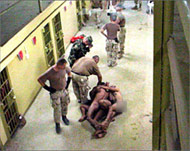US wants court exemption renewed
The US hopes to persuade the UN Security Council to renew a controversial resolution exempting American personnel from prosecution by the new International Criminal Court.

Although the resolution is expected to be adopted on Friday, opposition among the wider UN membership following the abuse by Americans of prisoners in Iraq, Afghanistan and Guantanamo is expected.
Two years ago the same resolution was adopted unanimously after the US threatened to veto UN peacekeeping missions, one by one. But a year ago, three countries abstained.
This year at least four nations – Brazil, Spain, Germany and France – are expected to abstain.
But US officials are confident they will reach the minimum nine votes needed for adoption in the 15-nation council.
Avoiding prosecutions
Some 94 countries have ratified a 1998 treaty creating the court.
But Washington has signed bilateral agreements with 89 countries who promised not to prosecute American citizens anywhere as well as anyone under contract to the United States, said Richard Grenell, spokesman for US ambassador John Negroponte.
 |
|
Victims of US abuse will have no |
Some of those who ratified the treaty also signed the agreement with the United States, which in some cases is tied to aid.
As the first permanent global criminal court, the ICC was set up to try perpetrators for the world’s worst atrocities – genocide, mass war crimes and systematic human rights abuses.
The tribunal went into operation in The Hague, Netherlands, this year and is investigating massacres in the Congo and by the brutal Lord’s Resistance Army in northern Uganda.
Beyond reach
The draft resolution, introduced by the United States on Wednesday, would place US troops and officials serving in UN-approved-missions beyond the reach of the court.
Specifically, it would exempt “current or former officials” from prosecution or investigation if the individual comes from a country that did not ratify a 1998 Rome treaty that established the tribunal.
The United States argues it cannot put itself under the jurisdiction of a foreign court it did not authorise and says its many troops abroad would be open to politically motivated prosecutions.
Proponents of the court say that there are enough safeguards in its statutes to protect countries like the United States, which has a functioning judicial system that would take priority over egregious cases.
Under former President Bill Clinton, the US was one of 135 nations that signed the treaty, but the Bush administration rescinded the signature.